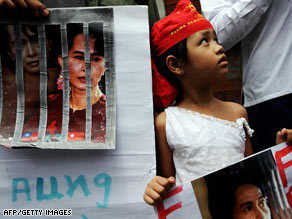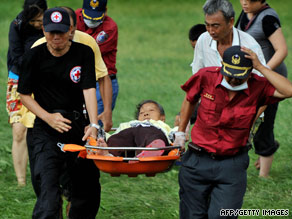Sunday's historic election win by Yukio Hatoyama's party breaks a deadlock in parliament and will usher in a government that has promised to focus spending on consumers, cut wasteful budget outlays and reduce the power of bureaucrats.
The defeated Liberal Democratic Party (LDP) was left to lick its wounds after its worst election performance since the conservative party was founded in 1955. The party had ruled Japan for most of the last half-century.
"It's taken a long time, but we have at last reached the starting line," Hatoyama told a news conference at his home a day after voters gave his party a sweeping mandate for change.
"This is by no means the destination. At long last we are able to move politics, to create a new kind of politics that will fulfil the expectations of the people."
The yen rose to a 7-week high, buoyed by the end of electoral uncertainty. Japanese stocks, after hitting a near 11-month high earlier in the day, closed slightly down as the stronger yen sent shares of exporters lower.
Hatoyama is to set up a transition team to organise the change of government, but has said he will not announce his cabinet until he is officially elected prime minister by a special session of parliament, probably in about two weeks.
The Democratic Party's landslide win failed to lift a downbeat mood in a rainy Tokyo, where there was little post-election euphoria. Many voters and analysts said the victory was driven more by frustration with the LDP than broad support for the decade-old opposition.
"It's not that the Democrats were good. I voted for them as a punishment for the LDP. The LDP has to change," said Etsuji Inuzuka, 47, who works in the furniture business.
SPENDING WORRIES
Investors welcomed the end to a political deadlock that has stymied policies as Japan struggled with its worst recession since World War Two. The Democrats and its small allies won control of the upper house in 2007, enabling them to delay bills.
But many were concerned about whether the party would be able to maintain fiscal discipline after promising policies such as cash handouts for families with young children and the abolition of expressway tolls, a Reuters survey showed.
"Fiscal issues, together with diplomacy and security, will be a major issue," said Junko Nishioka, chief Japan economist at RBS Securities.
Media forecasts show the Democrats won about 308 seats in the lower house, nearly tripling their strength in the 480-member chamber. The LDP won only 119 seats, down from 300.
"The problem is how much the Democrats can truly deliver in the first 100 days," said Koichi Haji, chief economist at NLI Research Institute.
The Democrats, who will face an upper house election in less than a year, must move fast to keep support among voters worried about a record jobless rate and a rapidly ageing population that is inflating social security costs.
Japan is ageing more quickly than any other rich country. More than a quarter of Japanese will be 65 or older by 2015.
Analysts say the Democrats' spending plans might give a short-term lift to the economy, just now emerging from recession, but worry that its programmes will boost a public debt already equal to about 170 percent of GDP.
"I hope that the new government will implement appropriate policies to overcome the various challenges Japan is facing," Bank of Japan Governor Masaaki Shirakawa told a news conference.
STRAINS IN U.S. TIES?
A fourth-generation politician, Hatoyama is known less for economic policies than for his stance on security and diplomacy.
He has advocated revising Japan's pacifist constitution to acknowledge the nation's right to defend itself and said Tokyo's foreign policy was too subservient to Washington.
Tokyo's contributions to U.S. military operations abroad could cause friction under the Democrats, although the party has stressed continuity in ties with Washington.
Hatoyama himself raised eyebrows this month in an essay that railed at the "unrestrained market fundamentalism" of U.S.-led globalisation. He played down those comments late on Sunday.
"Washington can take some comfort from knowing that dire predictions of a dramatic leftward-course shift from the Japanese ship of state are wrong," said Bruce Klingner of the Heritage Foundation think tank in Washington.
"But even minor policy changes or alterations in tone will have far-reaching implications and cause strains."
The Democrats have also vowed to improve ties with Asian neighbours, often frayed by bitter wartime memories.
The party's victory ended the "iron triangle" -- a three-way partnership between the LDP, big business and bureaucrats that turned Japan into an economic juggernaut from the ashes of the country's ruin in World War Two.
That strategy foundered when Japan's "bubble" economy burst in the late 1980s and growth has stagnated since.
(Additional reporting by David Dolan, Yumi Otagaki, Yoko Kubota, Yoko Nishikawa, Risa Maeda and Paul Eckert)
Copyright © 2008 Reuters




